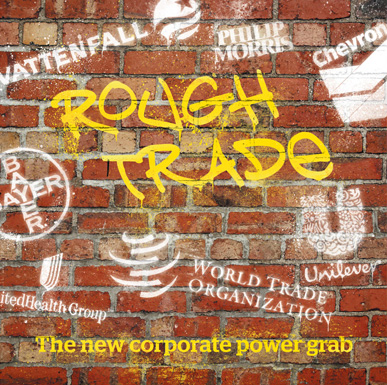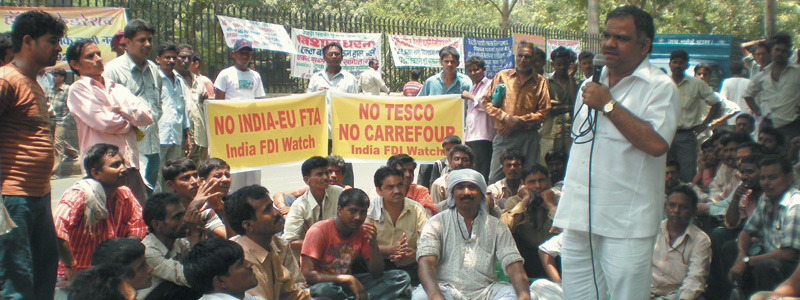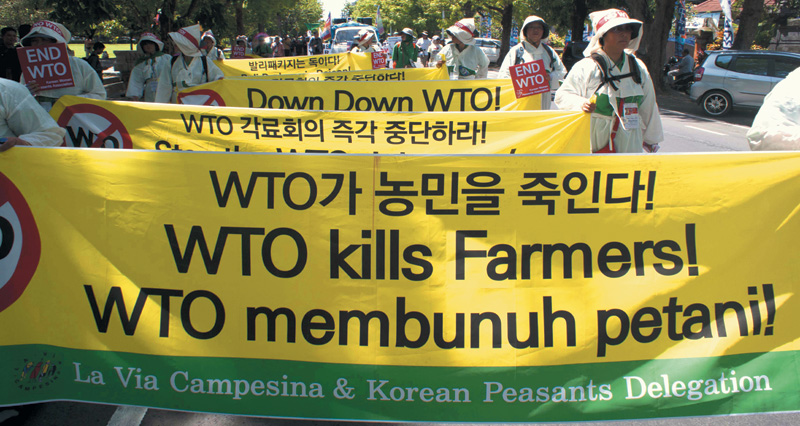Rough trade: the new corporate power grab

Red Pepper | February 2014
Rough trade: the new corporate power grab
Trade and investment agreements currently being negotiated will mean the biggest corporate power grab in a decade. We need a new global movement to confront them, writes Nick Dearden
The World Trade Organisation (WTO) was little known when its 1999 summit brought campaigners from across the world to Seattle to confront the trade liberalisation agenda. A mixture of creative street protests, brutal policing, an atrociously organised conference and a bloc of developing countries prepared to say ‘no’ defeated the WTO’s plans.
From that point forward, so-called ‘trade liberalisation’ joined ‘third world debt’ as an iconic issue that defined the global justice movement. Here were two mechanisms through which corporations had captured political power for their own interests, whatever the cost in terms of poverty, inequality and environmental destruction. At summit after summit the alter-globalisation movement fought international institutions like the WTO to a standstill.
True, we didn’t manage to stop the signing of a plethora of ‘free trade’ agreements, often known as bilateral investment treaties (BITs), which advanced corporate power piece by piece. But from 1999 until 2013 the WTO was unable to sign a global agreement, and we held up attempts to embed the extension of corporate power into, for instance, public services in an international treaty.
Neoliberalism strikes back
That was until last December, when the WTO finally did sign an agreement in Bali, Indonesia. It was not on the ambitious level of previous summits where the WTO attempted to become a form of global government. The US and European Union were forced to compromise in their attempts to tell countries such as India and Bolivia that they must sacrifice their people’s ‘right to food’ when it contradicted the rule of the market.
But the Bali deal is significant nonetheless, not only because it represents a step forward for corporate power but because the WTO again becomes a lynchpin for a series of far-reaching trade deals. If passed, these deals will represent the biggest transfer of sovereignty from people to corporations in at least a decade. We need a movement of the breadth and diversity of the alter-globalisation movement to bring these dangerous plans to a halt.
There are three agreements currently being negotiated. They are dangerous both because of their scope and because they aren’t simply bilateral but ‘plurilateral’ agreements (that is to say, negotiated by a ‘coalition of the willing’) with the intention of becoming global, enforceable standards, without having to deal with difficult countries like Bolivia and Venezuela in the negotiations themselves.
Furthest along in terms of negotiations is the Trans‑Pacific Partnership (TPP) being agreed by a mixture of North and South American, Asian and Australasian countries. Next is the Trade in Services Agreement (TISA), which is an attempt to embed the deregulation of all ‘services’, including healthcare and education, through to banking and postal services. Finally, the Transatlantic Trade and Investment Agreement (TTIP) will create a free trade area between the US and EU. The UK government is overjoyed about it, and it might bring some of the issues of trade home to a European audience.
All of these agreements are being negotiated secretly, with hundreds of corporate lobbyists given special access to the process. All of them will erode democracy, further hardwire ‘free market’ principles into the global economy and enforce corporate power through parallel legal systems that make states accountable to corporations rather than vice versa.

Corporate power: a new frontier
The first thing to bear in mind about these treaties is that they aren’t interested in ‘free trade’, and often not with any sort of trade as conventionally understood. At their centre, the agreements protect capital, usually described as ‘investment’ (another misnomer, as Christine Haigh points out).
Just look at the Trans‑Pacific Partnership Agreement. Wikileaks recently revealed that at the centre of this treaty is ‘patent protection’ giving corporations more rights, for longer, over things like medicines. There’s even talk of patenting surgical procedures – a terrifying extension of what a corporation can own.
As things currently stand, the trade agreements will also include parallel legal processes, which will mean corporations have access to special courts that are biased towards their interests. One such court is the WTO’s Dispute Settlement Mechanism, which the Transnational Institute says ‘makes the WTO one of the most powerful multilateral agreements in the world, because it is legally enforceable’.
As John Hilary explains, these processes, known generically as ‘investor-state dispute mechanisms’, are being used to sue governments across the world for passing laws in the public interest that hinder the ability of tobacco, energy and water corporations to make profits. Just as governments from Ecuador to South Africa – and even Australia – are reconsidering these corporate courts, the new trade agreements threaten to make them even more powerful.
All of the agreements will reduce environmental standards, and consumer protections. The European Commission has been clear that the biggest ‘trade barriers’ are not tariffs at all, but ‘for example, different safety or environmental standards for cars ... The goal of this trade deal is to reduce unnecessary costs and delays for companies.’
No wonder Wall Street’s investment banks are rubbing their hands at the thought of being able to rid themselves of the post‑crash Frank-Dodd restrictions on the financial sector. The fact these regulations don’t exist in the EU is likely to mean a race to the bottom as standards are harmonised. What’s more, taxing and regulating Wall Street through, for example, a ‘Tobin tax’ on financial transactions or controls of capital flows will become virtually impossible.
Think also about environmental protection. To take one example, the Transatlantic Trade and Investment Partnership would likely encourage the export of shale gas (fracking) to the EU, thereby increasing its exploitation in the US. It could well sweep away standards on genetic modification and hormone‑treated beef.
According to US group Public Citizen, the Trans‑Pacific agreement will ‘empower foreign corporations to skirt domestic laws and courts and directly challenge governments’ health, environmental and other public interest policies before extrajudicial tribunals authorised to order unlimited amounts of compensation with taxpayer dollars’. The same could be written of the whole offensive.
Capital wins, workers lose
The ever‑compliant media has been spreading the good news of free trade. The BBC and others have already highlighted the two million jobs and $120 billion they have been told the Transatlantic agreement will add to the EU and US economies.
According to the Seattle to Brussels Network, the job figures are a fantasy covering up the massive restructuring that the agreement would entail. The Network points out that the North American Free Trade Area launch in 1993 promised the creation of 20 million jobs, but in the end the US suffered a net loss of almost a million jobs.
What’s more, the quality of jobs is bound to decrease because of the downward pressure on wages of increased competition, the increased flexibility given to corporations and the standardisation of labour regulations. The Seattle to Brussels Network says ‘there is a risk that entire regions within the EU will carry the whole weight of social costs of this transatlantic project’, further fostering inequality within Europe.
If you’re not convinced yet, the agreements will also further prevent governments from using their buying power to protect and develop their own industries and workers. The Trade in Services Agreement will go further than previous services agreements. At least under the General Agreement on Trade in Services (GATS), countries could theoretically choose which services they wanted to liberalise. TISA intends to cover most services compulsorily – presumably including healthcare, energy and education.
Think of the potential impact on the NHS, when the internal market and deregulation of recent years are extended, and US health corporations have the right to sue the British government if it tries to ‘backtrack’ in the public interest. Civil liberties groups are also concerned that the stricter laws around, and policing of, intellectual property will effectively resurrect the Anti-Counterfeiting Trade Agreement (ACTA) defeated by major street protests in Europe and its rejection by the European Parliament in 2012.
The fight this time
Anyone concerned about people, the environment, the NHS, civil liberties, HIV or democracy in general will have reason to fear the new trade offensive. Our opponents fully understand the nature of the war being waged. The European Services Forum is a lobby group for big business involved in services. Its representative Pascal Kerneis told a meeting on EU investment policy in 2011: ‘Industry will oppose any deal in which investment protection is traded off against public policy objectives, including human and labour rights.’
To defeat this offensive, we will need a broad and diverse movement with diverse tactics. Street protests are essential. It was street protests, combined with petitions and web hacking, that brought down the Anti-Counterfeiting Trade Agreement, which would have brought about a new global intellectual property regime. Thousands on the streets in countries such as Poland and Slovenia helped unwind the proposals. The same people should be just as concerned at the Transatlantic agreement, but we need to start telling the real story about the proposals.
Activism is far more advanced than in Europe in the US, where campaigners have been joining up with Asian social movements to oppose the Trans‑Pacific agreement. Strategic discussions are now taking place across the EU and with US groups to begin serious mobilisation here in Europe.
At the WTO, the coordination between those outside and inside the summit, especially those working to strengthen progressive developing countries, has been vital in halting that organisation’s pro-corporate agenda. We need to make similar links here. Caroline Lucas’s early day motion in parliament (see page 13) is a welcome first step. We must use the European elections to ensure that candidates are forced to come clean on whether they serve the people or corporate interests.
The Transatlantic agreement will affect those in the global South again, giving access to Europe’s bilateral investment treaties to US corporations and vice versa. But the deal will also bring home to people in Europe the nature of ‘trade’ agreements. This gives the potential for real North-South mobilisation.
Finally we need to give people an alternative. A generation of activists have known nothing apart from deregulation and liberalisation. We have all been affected by a propaganda onslaught that has told us ‘the market knows best’.
Some great work has been done by the Alternative Trade Mandate initiative, which has produced a manifesto on the principles that should underline trade and investment rules. At the European elections, all candidates will be asked to sign up to these principles. Of course, these principles are already being implemented in some parts of the world, including South America, where the Bolivarian Alliance for the Peoples of Our America (ALBA) was established by Venezuela, Bolivia and others. Unlike 15 years ago, we have a concrete example of how things could work.
Perhaps most exciting is the fight against the investor-state dispute mechanisms – the corporate courts – which even right-wing governments are turning against. If we keep these mechanisms out of the new treaties, this will be a major victory against corporatocracy.
Who knew that the implementation of the North American Free Trade Agreement 20 years ago would spark one of the most exciting uprisings of our era – the Zapatistas in Chiapas, Mexico? The impact of that rising was crucial to the politics of South America and the emergence of the anti-globalisation movement. It’s time to make sure corporate power has over-extended itself again.
Democracy and public services are threatened by the new EU-US trade agreement, says Caroline Lucas MP
Our government doesn’t think much of the idea of human rights, and still less of the suggestion that we should create new ones. It has, however, been championing a raft of new EU protections for one powerless, vulnerable group. I refer, of course, to multinational corporations.
When the EU and the US started negotiating the Transatlantic Trade and Investment Partnership (TTIP) last year, David Cameron declared: ‘This is a once-in-a-generation prize and we are determined to seize it.’ So were corporations, who as part of the agreement are to be endowed with a range of ‘investment protection provisions’.
The promised economic benefits of TTIP are dubious. History has shown that such treaties haven’t delivered the jobs they promised. Bill Clinton promised that NAFTA would bring 200,000 new jobs for Americans – before 680,000 were lost.
There is much in TTIP to be worried about, and there are strong arguments in favour of relocalising our economies, not globalising them further. There are also big questions about why we should enter into a transatlantic partnership, supposedly based on mutual trust, given recent revelations of the US secret services’ surveillance of EU citizens.
However it’s the planned inclusion of an investor-state dispute settlement (ISDS) mechanism that has rightly drawn the most intense criticism. It gives big business licence to sue democratically-elected governments whenever they perceive their ‘rights’ to have been violated. Such claims will be considered not by the sovereign courts of those countries but by a panel of judges, many of them corporate lawyers, deliberating behind closed doors, with the power to overthrow decisions made by democratically-elected parliaments and under no obligation to consider the rights of citizens. We shouldn’t be surprised if we see challenges from private healthcare companies to policy decisions aiming for a publicly provided NHS, or from energy companies on government attempts to freeze fuel prices.
Member states have their own sovereignty and their own arbitration systems for companies that feel they are getting a raw deal. Imposing an EU-wide system that overrides national laws is only necessary if you want to water down social and environmental protections that are perceived by businesses as barriers to business.
The EC assures us that it is merely trying to find ‘a better balance between the right of states to regulate, and the need to protect investors’. Yes – rights are being rebalanced. They’re being rebalanced in favour of powerful, unaccountable, corporations, and against democratically elected governments, and the citizens who rely on them for protection.
The agreements and their opponents
World Trade Organisation (WTO). A global treaty agreement to create a ‘rules-based’ system for international trade. The WTO institution was created in 1995 out of the post-war General Agreement on Tariffs and Trade treaty but is much more powerful because its rules are legally enforceable. However, the need for international agreement has slowed its progress. Third World Network provides analysis and campaigning and Our World is Not For Sale brings together anti-WTO groups worldwide.
Bilateral Investment Treaties (BITs). Signed between two countries, there are thousands of such treaties in existence, many of which include recourse to legal channels to give corporations ‘investor protection’. The website www.bilaterals.org is a great source of information and analysis and the Seattle to Brussels Network runs targeted campaigns.
Trans‑Pacific Partnership (TPP). A new treaty being negotiated by a mixture of North and South American, Asian and Australasian countries. There are many campaigns to halt this treaty – search for ‘No to TPP’ to find some.
Trade in Services Agreement (TISA). Negotiations are being conducted by 27 countries. TISA is an aggressive attempt to deregulate services for global corporate ‘investment’. The Public Services International trade union federation has extensive resources.
Transatlantic Trade and Investment Partnership (TTIP). The EU-US trade deal, which David Cameron is extremely keen on. Alliances are currently being formed to oppose the treaty and there is work being done by the Corporate Europe Observatory, the Transnational Institute and the Seattle to Brussels Network. Check out the World Development Movement for more information as it emerges.






